GRAD NEWS | UNDERGRAD NEWS | FACULTY NEWS | ALUMNI SPOTLIGHT | EVENTS | OPPORTUNITIES & DEADLINES
CHAIR’S LETTER: Spring 2022
Dear Feminist Studies Community,
Our spring quarter is beginning amidst numerous challenges at home and across the globe, including the disaster continuing to unfold in Ukraine. Given the numerous uncertainties, I have especially appreciated how our community – faculty, staff, and students alike – have risen to the moment, managing and even thriving in many ways, as this newsletter illustrates.
We have two FMST book events coming up: Prof. Marisol LeBrón’s book entitled Against Muerto Rico: Lessons from the Verano Boricua will be celebrated on April 7. Then in May, Prof. Gina Dent and Prof. Emerita Angela Davis’s book (with co-authors Erica Meiners and Beth Richie) – Abolition. Feminism. Now. – will be the focus of discussion at a university-wide event at the Quarry. Professorts Madhavi Murty and Felicity Schaeffer also have new books coming out soon. All are exciting works by our feminist scholars.
It is also with great pleasure that we congratulate Prof. Nick Mitchell on receiving the 2021-2022 Distinguished Teaching Award from the Committee on Teaching. In their award letter, the committee highlighted Nick’s commitment to supporting a diverse student body at UCSC “by reshaping the institution to enable students to pursue their own visions of scholarly development.” This is a prestigious and very well-deserved award. Congratulations, Nick!
This spring we are also excited to celebrate the accomplishments of our graduating seniors. They deserve special recognition, since succeeding through fully remote instruction over the past two years required special perseverance and hard work. We wish them the best of luck in their next adventures! We will celebrate them together at the Feminist Studies Senior Celebration on June 10. Mark your calendars!
We also extend congratulations to our graduate students: Dr. Vivian Underhill successfully completed her PhD this past quarter; Anne Napatalung and Marina Segatti have received Summer Dissertation Fellowship Awards from The Humanities Institute, and Kaiya Gordon received a UCSC Social Science Research Council Dissertation Proposal Development award. We also extend our heartfelt thanks to all graduate instructors for their support of our undergraduate students.
Welcome to Spring quarter!
Zsuzsi Abrams
Interim Chair, Feminist Studies / Professor, Languages & Applied Linguistics, UCSC
GRADUATE STUDENT NEWS
Dr. Vivian Underhill earns her PhD
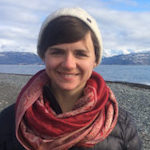 Kudos to Vivian Underhill, who successfully defended her dissertation and earned her Feminist Studies PhD in January 2022.
Kudos to Vivian Underhill, who successfully defended her dissertation and earned her Feminist Studies PhD in January 2022.
Vivian’s feminist research focuses on critical race science studies and intergenerational environmental-justice activism. Her dissertation, Like Oil And Water: Fracking, Groundwater, and Racialized Landscapes in California’s San Joaquin Valley, was developed with mentorship from FMST Professor Karen Barad and Vivian’s dissertation committee, FMST Professor Felicity Schaeffer and Sociology Professor Lindsey Dillon. Vivian’s work explores the production of the contemporary San Joaquin Valley through colonial modes of oil and water infrastructure and management – and their failures. It shows that understanding the infrastructures through which oil and water are managed and come to have meaning requires understanding the role of settler colonialism and racial capitalism in producing the contemporary landscape.
Vivian received a T32 postdoctoral grant, funded by the National Institutes of Health, at Northeastern University's Social Science Environmental Health Research Institute. She is currently working with Dr. Sara Wylie and Dr. Phil Brown to extend her community-based research in the San Joaquin Valley with larger networks of engaged environmental health research around the effects of oil and gas extraction.
During her time as a graduate student at UCSC, Vivian was the recipient of a prestigious 2020-21 fellowship from the American Association of University Women (AAUW. She also was a member of The Humanities Institute’s inaugural cohort of Public Fellows in 2016-17, and received a 2018-19 UCSC Social Science Research Council Dissertation Proposal Development grant that supported her field work in the San Joaquin Valley.
FMST Grad students awarded dissertation fellowships
Kaiya Gordon was awarded a UCSC Social Science Research Council Dissertation Proposal Development (UCSC SSRC-DPD) Fellowship for their project, "Abolition, Community Practices, and Gender Variance in the Transsexual News Telegraph Collection."
Kaiya’s research sheds light on trans identity formation and solidarity networks across prison walls, with an eye towards a trans abolitionist past and future. The initial stage of their dissertation will examine a specific DIY magazine, Transsexual News Telegraph, as an opening into larger questions surrounding trans communication with community, the incarceration of trans people, the medicalization of transness, and discourse of the late ‘90s and early 2000s in the U.S. regarding gender variance.
Additionally, two 5th-year FMST graduate students were awarded Summer 2022 Dissertation Fellowships from The Humanities Institute to support progress on their dissertations:
Anne Napatalung - for her dissertation on “The Tuskegee School of Midwifery: Exposing the Suppression of Black and Indigenous Midwifery Knowledges in U.S. Medicine in Service to Reimagining Reproductive Care.”
Marina Segatti - for her dissertation exploring “Queer and Trans Digital Activism: Neoconservatism and Democracy in Brazil.”
Anne and Marina will present their work at the annual Graduate Research Symposium, hosted by the UCSC Graduate Division in Spring 2023. Congrats to our graduate scholars on their progress toward completing their PhDs!
News from FMST PhD alums
Dr. Erin McElroy, an assistant professor in the Department of American Studies at UT-Austin, was awarded a prestigious Anti-Monopoly Fund Fellowship for their anti-eviction mapping project. More info here.
UNDERGRADUATE STUDENT NEWS
 Spring meet-ups!
Spring meet-ups!
UG Student Rep Yali Bitan is planning to host a few undergrad meet-ups during Spring quarter – a great way to get to know fellow FMSTers and form community.
The first meet-up is Thursday, April 7 at 5:30 pm – a pizza party in Cowell Meadow! Come on out, grab a slice and hang out with fellow FMST students. And keep an eye out for emails from Yali about future FMST hangouts!
Announcing our 2022 FMST 21st Century Scholars awardees
Congratulations to three FMST undergrads who were awarded $1,000 scholarships from the Feminist Studies 21st Century Scholars endowment to aid in the pursuit of their research projects. The 21st Century Feminist Scholars program supports new and rising scholars in the field of feminist studies by providing support for independent research, research-related travel, or experiential learning.
Kudos to our 21st Century Scholars:
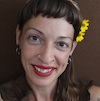 Maria Hele’s project, "Motherhood: A True Story in Four Parts," brings together questions about labor, land, care work, art and storytelling by foregrounding motherhood. Maria will continue working with faculty advisor Madhavi Murty to see the project through to its completed form.
Maria Hele’s project, "Motherhood: A True Story in Four Parts," brings together questions about labor, land, care work, art and storytelling by foregrounding motherhood. Maria will continue working with faculty advisor Madhavi Murty to see the project through to its completed form.
 Marissa Jefferies’ project "Cuban Women in Labor and LGBTQ Rights," is an ethnographic exploration, grounded in feminist epistemologies, of Cuban feminisms that will work to build solidarities across borders. Marissa’s project advisor is FMST PhD Candidate Anne Fosburg.
Marissa Jefferies’ project "Cuban Women in Labor and LGBTQ Rights," is an ethnographic exploration, grounded in feminist epistemologies, of Cuban feminisms that will work to build solidarities across borders. Marissa’s project advisor is FMST PhD Candidate Anne Fosburg.
 Denise Lo received the award for her project "Women in the Old and New: A Historical Search of Womankind's Burden." Working with faculty advisor Professor Felicity Schaeffer, Denise’s project uses the aestheticization of the feminine form as a point of departure to think about the longer and varied histories of feminine performance.
Denise Lo received the award for her project "Women in the Old and New: A Historical Search of Womankind's Burden." Working with faculty advisor Professor Felicity Schaeffer, Denise’s project uses the aestheticization of the feminine form as a point of departure to think about the longer and varied histories of feminine performance.
SAVE THE DATE! FMST Senior Celebration – Friday, June 10
Every year, we hold a special event to honor our graduates. We’re very excited that this year’s event – celebrating Feminist Studies majors who graduated in Fall 2021, Winter 2022, or will graduate in Spring or Summer 2022 – will be happening in-person!
 Mark your calendar!
Mark your calendar!
Remember, it's each student's responsibility to make sure they are on track to graduate. Please review the UCSC graduation and FMST major requirements. And if you have any questions, make an advising appointment right away.
FMST Transfers Visiting Day
On Friday, April 15, the Feminist Studies department will host an in-person visiting day for prospective transfer students from three local community colleges – Cabrillo, De Anza and Monterey Peninsula Community College.
Prospective students will have the opportunity to meet with FMST faculty, and current FMST transfer students will host a virtual Q&A to answer prospective students’ questions about the major. Participants are also invited along for a virtual tour of the UCSC campus with undergrad tour guides from STARS (Services for Transfer and Re-Entry Students).
The event is sponsored by the Baskin Feminist Scholars Program, funded by the Peggy and Jack Baskin Foundation, which is designed to attract and retain local transfer students to Feminist Studies and to provide underserved populations the opportunity to pursue a FMST degree.
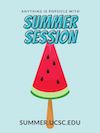 Summer Session enrollment opens May 1!
Summer Session enrollment opens May 1!
Summer is an opportunity to continue progress toward your degree. And there are definite benefits to signing up for a Summer Session course (or two) … Smaller classes and condensed coursework – get another class under your belt in five weeks! One tuition fee for all students, in and out-of-state. Tuition remains the same as last summer - $279 per credit, no increase! And Financial Aid grant funding is available for eligible Slugs.
Get all the details about Summer Session here. Enrollment opens May 1 for these Feminist Studies Summer classes:
Graduating? Check out post-UC career resources
Whether you’ve graduated or will be soon, you may want to look into UCSC Alumni Career Support for Slugs.
The UCSC Alumni Career Design Fellowship is a flexible 30-day online program that helps give you clarity, a plan, and the confidence you need to determine what’s next for your post-college career. It’s open to any and all alumni, whether you’re just getting started or mid- or late-career. And there are scholarships available to help cover program costs. Apply to get a partial scholarship for a UCSC Alumni Career Design Fellowship here.
The UCSC Alumni Career Network also offers tons of virtual webinars designed to provide UC alumni and community members with insights, information, and connections to launch, grow and expand your career opportunities. The network is a volunteer-driven education series made possible by generous UC alumni who share their experience and knowledge. Each month they tackle a different career topic, from how to ace an interview to first-generation professional development and effective salary negotiation, offering insider tips and advice to help you achieve your goals.
You can also join the Career Advice Network and get firsthand one-on-one mentoring from fellow UC alums.
FACULTY NEWS
Two new books by FMST professors coming this Spring
Congratulations to two Feminist Studies professors who will be celebrating the publication of new books this Spring.
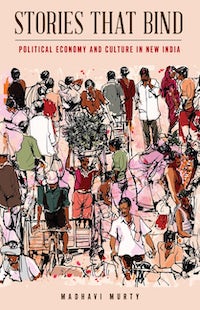 Assistant Professor Madhavi Murty’s new book, Stories that Bind: Political Economy and Culture in New India, will be out in May from Rutgers University Press.
Assistant Professor Madhavi Murty’s new book, Stories that Bind: Political Economy and Culture in New India, will be out in May from Rutgers University Press.
Stories that Bind examines the assertion of authoritarian nationalism and neoliberalism, both backed by the authority of the state, and argues that contemporary India should be understood as the intersection of the two. More importantly, the book reveals, through its focus on India and its complex media landscape, that this intersection has a narrative form, which Professor Murty labels “spectacular realism.” Murty shows that the intersection of neoliberalism with authoritarian nationalism is strengthened by the circulation of stories about “emergence,” “renewal,” “development,” and “mobility” of the nation and its people. Studying stories told through film, journalism, and popular non-fiction, along with stories narrated by political and corporate leaders, she argues that Hindu nationalism and neoliberalism are conjoined in popular culture and that consent for this political economic project is crucially won in the domain of popular culture. Moving between mediascapes to create an archive of popular culture, Stories that Bind advances our understanding of political economy through material that is often seen as inconsequential, namely the popular cultural story.
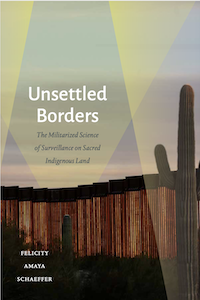 The new book by FMST Professor Felicity Amaya Schaeffer – Unsettled Borders: The Militarized Science of Surveillance on Sacred Indigenous Land – will be out in June from Duke University Press.
The new book by FMST Professor Felicity Amaya Schaeffer – Unsettled Borders: The Militarized Science of Surveillance on Sacred Indigenous Land – will be out in June from Duke University Press.
In Unsettled Borders, Schaeffer examines the ongoing settler colonial war over the US-Mexico border from the perspective of Apache, Tohono O’odham, and Maya who fight to protect their sacred land. Schaeffer traces the scientific and technological development of militarized border surveillance across time and space: from Spanish colonial lookout points in Arizona and Mexico; to the Indian wars when the US cavalry hired Native scouts to track Apache fleeing into Mexico; to the occupation of the Tohono O’odham reservation; and the recent launch of robotic bee swarms. Labeled “Optics Valley,” Arizona builds on a global history of violent dispossession and containment of Native peoples and migrants by branding itself as a profitable hub for surveillance. Schaeffer reverses the logic of borders by turning to Indigenous sacred sciences, or ancestral land-based practices that are critical to reversing the ecological and social violence of surveillance, extraction, and occupation.
Nick Mitchell receives prestigious COT: 2021-22 Distinguished Teaching Award
 We are very proud to announce that Associate Professor Nick Mitchell (FMST/CRES) is the 2021-22 recipient of the Committee on Teaching (COT) Distinguished Teaching Award.
We are very proud to announce that Associate Professor Nick Mitchell (FMST/CRES) is the 2021-22 recipient of the Committee on Teaching (COT) Distinguished Teaching Award.
This peer-nominated award recognizes Nick’s outstanding contributions to the culture of teaching at UCSC, his use of research-based pedagogy, and dedication to educational equity. The Committee especially lauded Nick’s positive impact and decisive role in creating new programs that foster the intellectual development of our students, notably through the creation of the Black Studies minor, and his success in creating space for diverse undergraduate and graduate students to thrive at UCSC. Congratulations, Nick!
FMST Faculty Awards, Publications, and Conferences
Gina Athena Ulysse had a busy Winter quarter, during which she presented at the following conferences and had an essay published:
The Michael Baptista Lecture Series 2021-2022: Envisioning Emancipatory Horizons in the Caribbean and Latin America, Unsilencing the Unthinkable, Center for Research on Latin America and the Caribbean (CERLAC), York College, Toronto Canada, February 10.
Opening keynote: “Free Falling and Finding Self: Meditations on Blackness and Rasanblaj,” Elms College 5th Annual Black Experience Summit: Stories of Our Becoming, The Shoulders on Which We Stand, Elms College, Chicopee, Massachusetts, February 17.
"Avant-Garde Rasanblaj: A Meditation on Potoprens," essay in PÒTOPRENS: The Urban Artists of Port-au-Prince exhibition catalog, edited by Leah Gordon and Joshua Jelly-Shapiro, Brooklyn: Pioneer Works catalog publication, March 22. Read the essay, published in Broadcast, here.
"Haiti at the Avant-Garde," a response to Mark Schuller's book Humanity's Last Stand: Confronting Global Catastrophe, Society for Applied Anthropology Conference, Salt Lake City, Utah, March 24.
ALUMNI SPOTLIGHT – Five Questions with a Feminist
Sarah Elkotbeid, Class of 2018 – Program Coordinator, Natural Resources Defense Council
The Five Questions with a Feminist interview series spotlights former FMST majors who have gone on to do great things. Visit our YouTube channel to view Professor Madhavi Murty’s recent interview with FMST alum Sarah Elkotbeid. Below is an edited version of their conversation.
 Sarah Elkotbeid graduated from UCSC in 2018 with a double major in Feminist Studies, with a concentration in culture, power and representation, and Environmental Studies, with a concentration in sustainable food systems and agroecology. Sarah is now a Program Coordinator with the Natural Resources Defense Council, an environmental non-profit that works to ensure the rights of all people to clean air, clean water and healthy communities. She currently works in San Francisco, where her focus is on NRDC's People and Communities Program.
Sarah Elkotbeid graduated from UCSC in 2018 with a double major in Feminist Studies, with a concentration in culture, power and representation, and Environmental Studies, with a concentration in sustainable food systems and agroecology. Sarah is now a Program Coordinator with the Natural Resources Defense Council, an environmental non-profit that works to ensure the rights of all people to clean air, clean water and healthy communities. She currently works in San Francisco, where her focus is on NRDC's People and Communities Program.
Hi Sarah. Tell us about what you’re doing now and what you love about it.
I work on various projects focused on reducing greenhouse gas emissions in the transportation sector. One of my projects is the American Cities Climate Challenge, where we work with various national and local partners to help 25 US city governments – [working with] their departments of transportation and sustainability offices – to reduce greenhouse gas emissions. I focus on transportation with my team and there’s also buildings and energy teams.
Another project I work on is called Delivering Zero Emissions Communities, where we focus on urban freight – medium to heavy-duty vehicles – and transitioning those to zero emissions.
There are also some internal projects I work on around diversity equity inclusion, which is where I plug in my feminist studies background.
How/why did you decide to major in Feminist Studies at UCSC?
Mainly it’s my background as an immigrant. I came to the US as a six year-old with parents born outside of the country, and my family was also very religious. I really saw gender binary norms played out in my household. I remember my Dad always saying, “God is first, then the husband, then the wife.” I remember one of my first original thoughts being, No, I don’t agree with that. That really started my journey. I started reading articles online, frequenting feminist websites like Everyday Sexism, watching YouTube videos about sexism in video games, because I played a lot of video games as a kid. Anything I had access to.
When I got to Santa Cruz, the only sure thing I knew I wanted to do was Feminist Studies.
That’s so relevant to how we teach feminist studies. The aim is to make sense of our own particularities, our own everyday lives, and the world in which we are positioned. Did your family evolve and get interested in feminist studies?
I was always the outsider in my family for a long time. Now it’s much better, but I don’t think that switch happened until after college. So it was a while. I didn’t have the best way to communicate what I thought or how I felt. I was just always butting heads with my family.
How did being a FMST major influence your professional goals and help you achieve them?
It 100% influenced my career. I always knew whatever I chose to do, it would be meaningful in the way that I want to feel I’m helping people in their lives. And specifically, the most vulnerable people, who are often women of color, low income people. In the environmental field, that comes down to environmental justice and communities experiencing environmental racism, and really centering on people who have been historically over-burdened by pollution.
In my field, I wanted a way in to a prestigious organization like NRDC, and then I thought about how can I fit social justice into everything we’re doing. In our field, we call it “equity.” Everything I’m involved in, I always ask: What does the community think about this? Who are we serving? What are the benefits to the communities that need it the most? I think that has been an agitator in a lot of ways, but in really good ways. With the Black Lives Matter movement in 2020, it really opened up everybody’s minds to thinking that way. I see myself continuing on that path within the environmental field.
What were your favorite FMST class or classes?
I loved Marxism as a Method with Professor Sara Benson. I remember learning about power and capitalism and how we interact with the economy. I remember learning about over-consumption and how people use that to self-gratify and “self-care.” And learning about the three phases of power: having ideological power to set the agenda. [A second phase where people] can’t express grievances, so the power to give people the runaround. And finally, decision-making power. Don’t take my word for this because it was a while ago!
In my everyday life, I notice these things when they’re happening. If I’m on the phone with a major corporation trying to get through to someone, that’s the runaround. They have the power to set the agenda. And when you look at politics, it’s obvious. I kept all my texts and materials and sometimes I flip through them.
When you reflect back, what were other important things you learned as a Feminist Studies major?
I learned this in your class, Gender and Postcoloniality… It really clicked with me that the struggle is violent. I’d heard that phrase but never really got it, and it really clicked with me in that class. Every day we struggle, and if we come from a marginalized community, there is violence inflicted upon us, sometimes by invisible actors. I think it justifies people’s frustration and anger and reacting in ways that aren’t easy to understand. You may not be doing something directly to this person, but they are still experiencing violence from the systems we live in, just because of conditions they’re forced to be in.
I remember writing it on my shoe, such a college thing to do! I looked at it every day, and I really felt it hard.
You’ve shared so much, is there anything else you’d like to share with our Feminist Studies students?
I think this is applicable to students in general, but definitely to FMST students. I feel like academia is really rich in knowledge, but also very theoretical. I remember struggling when I graduated and thinking: I love feminist studies, but how am I going to apply it? didn’t have that clear connection made on my own, and it took me a while to make it. So it was helpful to have my double major, and I know many FMST students do. You can take everything you learn in Feminist Studies and apply it in your other field and change it for the better. And every field needs it.
When you’re so young, you don’t know what the world is, what jobs look like, and how things work day to day. It’s kind of abstract. And feminist studies is relevant to every single job.
FMST EVENTS AND OTHER EVENTS OF INTEREST
Book talk and celebration: Against Muerto Rico: Lessons from the Verano Boricua, by Marisol LeBron – April 7, 4:30-5:30 pm PT
FMST and CRES present a hybrid in-person/virtual book talk with associate professor Marisol LeBron and discussant Camilla Hawthorne (SOC/CRES) for Against Muerto Rico: Lessons from the Verano Boricua(Editora Educacion Emergente). In-person in HUM 1, room 210. Register for the virtual presentation here.
Dissent Lecture Series – Spring 2022
The UCSC Center for South Asian Studies and THI present this year-long lecture series, curated by FMST professor Anjali Arondekar. All lectures are virtual, from 10am to 12 noon PT. Visit csas.ucsc.edu/events to learn more about each event and to register.
- April 8 – Lawyering in Times of Lawlessness: Defending Dissenters in India and Sri Lanka (1947-1972) – Rohit De, Associate Professor of History, Yale University and Associate Research Scholar in Law, Yale Law School
- April 29 – Being an Ambedkarite Under Hindu Rashtra – Suryakant Waghmore, Professor of Sociology, Indian Institute of Technology
Book launch event: Poetic Operations: Trans of Color Art in Digital Media by Micha Cardenas – April 11, 5pm
Assistant professor micha cardenas and respondents Gerald Casel and Nick Mitchell discuss micha’s new book, Poetic Operations, which considers contemporary digital media, artwork and poetry in order to articulate trans of color strategies for safety and survival. micha’s work draws on decolonial theory, women of color feminism, media theory, and queer of color critique to develop a method she calls algorithmic analysis, and how trans and gender-nonconforming artists can rewrite algorithms to counter violence and develop strategies for liberation.
Imagining America – April 27, 1pm
UCSC is now a member of the Imagining America Consortium, a group of artists, scholars, and organizers working to imagine, study, and enact a more just and liberatory “America” and world. Working across institutional, disciplinary, and community divides, IA strengthens and promotes public scholarship, cultural organizing, and campus change that inspires collective imagination, knowledge-making, and civic action on pressing public issues. This information session is an opportunity to learn more about the consortium, meet IA staff and National Advisory Board members, and hear about current and upcoming IA initiatives and programs. Register here.
UC Global Health Day – May 7
The UC Global Health Institute (UCGHI) and the UC Santa Cruz Institute for Social Transformation co-host this day-long collaborative conference that showcases innovative research and global health initiatives occurring across the University of California. This year’s theme, Centering Social Justice in Community Health, is exemplified by a slate of diverse speakers across a variety of disciplines who are doing work that benefits communities at local and global levels. Go here for more info and to register.
Deep Read: Transcendent Kingdom with author Yaa Gyasi – May 15
This year’s Deep Read features Yaa Gyasi’s Transcendent Kingdom. Students are invited to read along with the broader campus community and think deeply about faith, science, addiction, and race in our contemporary moment. Gyasi is a Ghanaian America writer who engages with literary and historical themes, such as trauma and the historical legacies of Atlantic slavery; racism and urban mobility; the experiences of first-gen college students; and scientific inquiry vs religious faith. Meet the author on May 15 at the Quarry Amphitheater. More info here.
Abolition. Feminism. Now. – May 21, 2:00-3:30 pm, Quarry Amphitheatre
Abolition scholars and co-authors Angela Davis, Gina Dent, Erica Meiners, and Beth Richie discuss their new book, Abolition. Feminism. Now. As a politic and a practice, abolition increasingly shapes our political moment. Yet erased from this landscape are not only the central histories of feminist – usually queer, anti-capitalist, grassroots, and women of color—organizing that continue to cultivate abolition but a recognition that abolition is our best response to endemic forms of state and interpersonal gender and sexual violence. Free and open to the public, this conversation is sponsored by the Institute of the Arts and Sciences, The Humanities Institute, Feminist Studies, and Bookshop Santa Cruz as part of the Andrew W. Mellon funded Visualizing Abolition initiative UC Santa Cruz. More event info here.
Living Writers Series: Celebrant: Sound Actions, Gina Athena Ulysse – May 26, 5:20-6:55pm, Humanities Lecture Hall
FMST Professor Gina Athena Ulysse will be the featured artist for this Celebrant: Sound Actions event. This Living Writers series showcases interdisciplinary writers who deeply engage in various sonic forms, whether the libretto and the operatic, sound and visual art, acoustic music and songwriting, or embodied meditations to explore the possibilities in being attentive to sound. Gina is a poet, chanteuse, cultural anthropologist, and black feminist ethnographer whose work engages rasanblaj, a gathering of ideas, things, people, spirits.
choose to begin/from the ground up/literally: – June 1, 12:15-1:30pm, in-person/virtual
The Center for Cultural Studies presents a conversation with LIT Professor Ronaldo V. Wilson and FMST Professor Gina Athena Ulysse. The event’s title is borrowed from Ulysse’s mixed-media assemblages and poetry. The presentation operates between urgencies, where Ronaldo V. Wilson will reflect on and with Gina Athena Ulysse’s meditations, work that leads and pulls from the earth into what Ulysse describes as the “ancestral imperative”— where material forms, sonic lineages, and images begin. More info and registration link here.
OPPORTUNITIES & DEADLINES
UCDC Information Sessions – April/May
The UCDC Washington DC program is an opportunity for undergrad students to spend a quarter attending classes and conducting an internship based in the nation’s capitol while registered as UCSC students and earning academic credit. Internship placements are geared to student interests, including government and public policy, the arts, the environment, social justice, and many other areas. Register for an information session here.
THI Public Fellowships – Deadline April 14
THI Public Fellowships create opportunities for Humanities students to contribute to research, programming, communications and other activities at non-profit organizations, companies, and cultural institutions. Fellows and the organizations they work with reflect the diversity of UCSC Humanities research and the commitment of students to connect their scholarly pursuits with the public. Past fellows have worked around the world, employing their skills and knowledge at organizations as diverse as The Center for the Study of the Holocaust and Religious Minorities in Oslo, Norway, the Tucson Chinese Cultural Center, the Japanese American Museum in San Jose, and the Santa Cruz Museum of Art and History. Graduate students are invited to apply for Summer and Year-long Public Fellowships. Applications for Undergrad Public Fellowships open in October. More info here.
Los Angeles Review of Books (LARB) Publishing Workshop – Deadline April 15
A five-week intensive summer course, the LARB Publishing Workshop gives students the opportunity to learn from industry professionals shaping print and digital publishing today. From June 20 - July 22, Workshop Fellows will participate in lectures and workshops featuring over 50 guest speakers. The program is open to graduating college seniors, recent graduates (alumni of any college or university), current graduate students, and people with relevant experience and interest in entering the publishing industry.For more information and applications visit thepublishingworkshop.com.
Graduate Research Symposium – Deadline April 15
After two years of virtual symposia, the 18th annual symposium returns to McHenry Library as an in-person live event on the Friday of Alumni Week, April 22, followed by a reception to announce the winners on the McHenry South Lawn. Go here for more info and to register to present your graduate work.
UCHRI PhD Research Internship, Summer 2022 – Deadline April 18
This internship program supports one UC graduate student to work on UCHRI’s systemwide programs for the summer, engaging in program development and evaluation and scholarly communications. The research intern will work up to 30 hours per week for seven weeks, typically between July and September (start and end dates are flexible). More info and link to submission form here.
Cornell University Summer Pathways Program – Deadline April 28
The Migrations Initiative’s Summer Pathways Program provides hands-on research training to first-generation students and students from underrepresented groups interested in studying migration and considering graduate school. From July 25 to August 4, participants will attend this hybrid program (online and in-person at Cornell’s Ithaca, NY campus). A stipend of $2,000 provided upon program completion supports each participant as they gain research skills, higher education networks, and practical knowledge about the graduate application process and PhD life. More info here.
All-In: Co-Creating Knowledge for Justice – Submission deadline May 15
The All-In Conference will take place in Santa Cruz on October 26-28, 2022. Co-presented by the Institute for Social Transformation at UCSC and Urban Research Based Action Network (URBAN), the conference brings together university scholars, community-based practitioners and researchers, undergrad and grad students, community members and organizations, foundation program officers, organizers, artists and activists to share stories, strategies, practices, and solution for action. Learn more and submit a proposal here.
CART Fellowship Program – Deadline June 10
Graduate students are invited to apply for a 2022-23 fellowship with the Center for Archival Research and Training. CART fellows get hands-on, paid experience in archival processing in an academic library, learn about library and archives career options, and get experience curating a physical exhibit for a public audience. Learn more about CART at an upcoming online information session on April 20, 12-1pm, and visit their website for more information.

